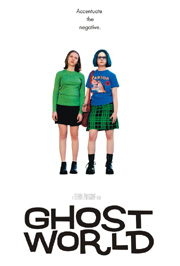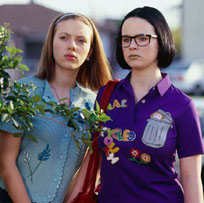| Ghost World |
| |
 |
USA, 2001. Rated R. 111 minutes.
Cast: Thora Birch, Scarlett Johansson,
Steve Buscemi, Illeana Douglas, Bob Balaban, Brad Renfro, Stacey Travis,
Charles C. Stevenson Jr, Dave Sheridan, Tom McGowan, Debra Azar, Brian
George, Pate Healy, Ezra Buzzington, Teri Garr
Writers: Daniel Clowes & Terry Zwigoff, based on the comic book
by Daniel Clowes
Music: David Kitay
Cinematographer: Affonso Beato
Producers: Lianne Halfon, John Malkovich, Russell Smith
Director: Terry Zwigoff
LINKS
|
 wenty
years ago, Amy Heckerling and John Hughes popularized a new kind of comedy:
the teen movie. Fast Times at Ridgemont High and Sixteen Candles
laughed fondly at their high school protagonists, who, burdened by pressure
from peers and hopelessly out-of-touch authority figures to conform in one way
or another, stumbled through seemingly arbitrary rites of passage. Those films
empathized with how hard it is sometimes to be a teen, validating their feelings
of angst and alienation, so often pooh-poohed by adults.
wenty
years ago, Amy Heckerling and John Hughes popularized a new kind of comedy:
the teen movie. Fast Times at Ridgemont High and Sixteen Candles
laughed fondly at their high school protagonists, who, burdened by pressure
from peers and hopelessly out-of-touch authority figures to conform in one way
or another, stumbled through seemingly arbitrary rites of passage. Those films
empathized with how hard it is sometimes to be a teen, validating their feelings
of angst and alienation, so often pooh-poohed by adults.
Now those movies are nearly twenty years old, and a new wave of teen movies
has hit theaters, targeted to a new generation of filmgoers--movies like She's
All That and Save the Last Dance.
For all the supposed raunchiness of movies like American Pie, most these
films have a sweet heart. But one can't help observing a key difference between
these and the teen movies of yesteryear: today there is far less negativity.
Movies celebrate teen culture now, while the darker fare of the Eighties subvert
it. Take, for example, Bring It On, a pleasant entertainment that actually
honors cheerleading--cheerleading--as a legitimate extracurricular teen
pursuit, or Clueless, which sided with its bubbleheaded protagonist,
the most popular girl in her class. Even 10
Things I Hate About You ultimately taught the outsider to accept her
peers and fit in. (In an odd reversal, more adult-oriented films like Election
and American Beauty have portrayed
the difficult, often tortuous journey to adulthood better than their youth-oriented
contemporaries.)
AboutFilm.Com
The Big Picture
|
| Alison |
-
|
| Carlo |
A-
|
| Claudia |
A
|
| Dana |
A-
|
| Jeff |
A-
|
| ratings explained |
In the Eighties, teen movies argued that it is okay and even understandable
to be an outsider. The blockbuster success of The Breakfast Club was
due more to its powerful anti-exclusionary message than it was to the presence
of a memorable story (there wasn't one) or its negligible comedic elements,
and the murderous antihero of Heathers would have gleefully exterminated
the cheerleaders of Bring It On. Even the lightest Eighties teen comedies
(Weird Science and Better Off Dead, for example) identified with
the "geeks" and skewered the "popular" kids--even Revenge of the Nerds,
which sympathized more with its titular losers than their preppie torturers.
As Suzanne Vega sang on the soundtrack to Pretty in Pink ("If you want
me/You can find me/Left of center/Off of the strip/In the outskirts/In the fringes"),
teen comedies were about the marginalized on the fringes of teen culture.
One of the latest entries in the genre is Ghost World, the new and first
entirely fictional film by Terry Zwigoff (Crumb), based on the graphic
novel of the same name. Going against the grain of current teen entertainment,
Ghost World is as far away from Dude, Where's My Car? as one can
get. For that reason, it's difficult even to think of it as a "teen movie"--it
seems more like an anti-teen movie--until one remembers the teen films of the
Eighties. Ghost World is a cinematic return to the fringes.
The heroine of Ghost World is Enid (Thora Birch), a disaffected young
woman not unlike Birch's Jane Burnham in American Beauty. She and her
best friend, Rebecca (Scarlett Johansson), love to sit on the sidelines and
make snarky comments about the world around them. Sometimes they go as far as
to torture the objects of their scorn, and one day, while looking through the
personals, they find an all-too-pathetic target: a lonely middle-aged record-collecting
geek (Steve Buscemi, in a quiet and beautifully modulated performance).
Enid and Rebecca seem smug, like they've got it all figured out, but Enid's
snark disguises a profound loneliness, and making fun of other people is an
inadequate comfort. It's patently obvious that the solution does not lie in
reconnecting with her peers, however; she has long since outgrown them and repudiated
their world by choice, not out of necessity. To her surprise, she finds herself
drawn to the record collector, Seymour. Unlike virtually everyone else she knows,
Seymour is a man of what-you-see-is-what-you-get straightforwardness and offbeat
interests, and no doubt Enid also identifies with Seymour's own self-hatred.
To his bewilderment, Enid appoints herself Seymour's new best friend. Where
she once disparaged his efforts to find love, she then encourages him to go
out and meet women, declaring that she hates the idea of a world where Seymour
can't get a date.
Meanwhile, having just graduated high school (except for the fact that Enid
must take a summer art course taught by flaky performance-artist Illeana Douglas,
who believes that political meaning is more important than form, technique,
or emotional expression), Enid and Rebecca dream of getting an apartment. For
Enid, the apartment represents a kind of misanthropic sanctuary, as well as
a means out of her home and away from her pathetically ineffectual father (Bob
Balaban), who is busy rekindling his relationship with the dreaded Maxine (Teri
Garr). But for Rebecca, the apartment represents forging ahead into adulthood.
She is showing disturbing signs of wanting to integrate herself into the real
world. The apartment requires getting a job, and Rebecca does so enthusiastically.
But Enid is ill at ease pumping goop on popcorn at the movie concession stand.
As Enid's relationship with Seymour deepens, she and Rebecca drift apart.
Though heartbreaking, Ghost World has also a sublime sense of dark humor,
playing on Enid's efforts to exist in a world of overly perky people and frauds,
all of whom might as well be space aliens as far as she is concerned. As Enid,
Birch navigates between acerbic wit and aching vulnerability, frequently communicating
Enid's inner life just with her eyes--which so often seem to say, "Who are
these people?" It's as if Enid, wise beyond her years, is the only person in
the world who sees clearly. What she perceives is that the world is brimming
with hypocrisy, and her instinct is to expose it. Naturally, this gets her into
trouble…repeatedly.
Teen movie or not, a film like Ghost World should not have a tidy ending
that ties everything up with a pretty bow, and it doesn't, providing a touching
closure for only one character. The ending can be interpreted in two different
ways (at least!), uplifting or disturbingly grim. The metaphor Zwigoff employs
provides food for thought, but it's acutely dissatisfying not knowing where
Enid's story goes from there. Regardless of its destination, Ghost World
has gone where few teen films are now willing to go--a thoughtful entry in a
genre that has lately lacked thoughtfulness.
Note: Stick around until the end of the credits for an amusing outtake.
Review
© August 2001 by AboutFilm.Com and the author.
Images © 2001 United Artist Films. All Rights Reserved.


